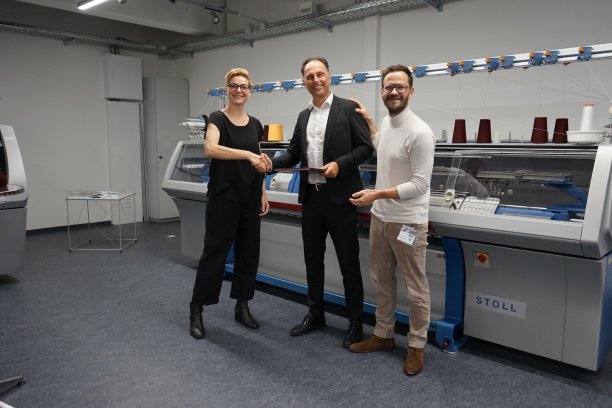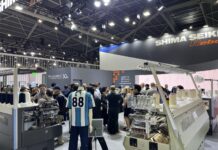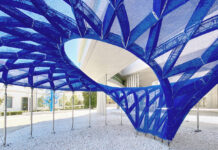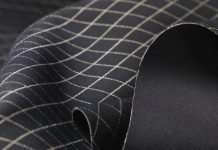Berlin
VORN – The Berlin Fashion Hub cooperates with Stoll and KM.ON on lighthouse project.
The registered cooperative VORN – The Berlin Fashion Hub, is using three ADF machines from Stoll and digital solutions from KM.ON – both brands of the Karl Mayer Group – to equip its microfactory currently under construction in Berlin’s Bikinihaus.
The platform is intended to bring together academics, brands, research institutes, start-ups and SMEs to create new ways of achieving greater sustainability and ethos. The goal is a fashion industry with a positive balance sheet. The pixel-to-product microfactory offers innovative hardware and software solutions for the physical, digital or hybrid implementation and testing of promising concepts, products and processes.
“We are delighted to be involved in the Fashion Microfactory project, because with our machines, which are predestined for efficient customisation thanks to their enormous patterning flexibility, and with our digital solutions, which significantly shorten lead times, we have been focusing on the topic of made-to-order for a long time and hope to gain new impetus and contacts,” says Michael Händel, Vice President Sales & Service at Stoll.
The contracts for the delivery of the flat knitting machines were signed on 9 July at Stoll’s headquarters in Reutlingen. Karl Mayer Group’s Ulrike Schlenker (US) took advantage of the visit by the two co-CEOs of VORN, Prof. Marte Hentschel (MH) and Oliver Lange (OL), to talk to them about their project.
US: You have just returned from a tour of the company. What is your impression of Stoll?
OL: I am still very enthusiastic. Great, creative, innovative people work here who drive their company forward.
Stoll ‘breathes’ German engineering and demonstrates continuity with its long history. At the same time, you can sense a great pioneering spirit. I experience Stoll as a strong, innovative, future-oriented manufacturer with entrepreneurial spirit and creativity. Its product strategy is impressive. With its machines, Stoll is close to the consumer market in many sectors and therefore has its finger on the pulse of time.
US: Let’s take a look at your pixel-to-product microfactory. What do you want to achieve with it?
MH: We were commissioned by the Berlin Senate Department for Economics, Energy and Public Enterprises to bring together design and manufacturing with technological innovation and sustainability. The aim is to make economic action and a sense of responsibility tangible, i.e. not just to talk about the necessary sustainability transformation, but to take action.
In our demonstration factory, we offer low-threshold access to everything that is necessary for this: machines, software and services so that progressive players can pilot their changes quickly and then scale them up for the market. We create all the prerequisites for fast, market-oriented and price-conscious implementation of small series.
This saves storage, material and return costs, reduces environmental impact and ensures more resilient supply chains in response to the challenges of our time. In addition, direct-to-customer production offers exciting margins and marketing opportunities – all advantages that make our pixel-to-product microfactory particularly interesting for brands. To take full advantage of this, we work with innovative partners from the entire value chain, from yarn suppliers to retailers.
US: Stoll is one of the partners, why?
MH: We have the same idea of cooperation and want to develop things further with courage, strength and curiosity.
OL: Stoll plays an active role in shaping the future. As a consequence, we emphasise on sustainability and digitalization. We believe in the same things and drive them forward in the same way.
MH: In addition to the shared set of values, we were impressed by the company’s flat knitting machines. They offer unique possibilities for the economical production of small batches, particularly with regard on demand production close to the market and garments that are seamless, i.e. with virtually little in the manufacturing process. This makes them a perfect fit for our concept. We also want to integrate Stoll’s customers into our network in order to scale up production to industrial levels.
US: The machines are due to be installed in August. What are the next steps?
MH: The opening of the Microfactory is planned for October. Preparations are in full swing. We are currently fitting out the premises in the Bikinihaus. The aim is not a conventional production facility, but a concept hall, a glass laboratory whose interior design showcases the production technology of the future to clients and end customers. The new workflow of virtual design, sales, payment and just in time production is to be brought to life.
In addition to the interior design, we are scheduling training sessions for our staff, working on a number of programmes, including applied R&D activities, and driving forward pilot projects with manufacturers and studios. We presented two outfits from the label SE 1 OG at the last Fashion Week Berlin. At the next fashion week, we want to celebrate the opening of the Microfactory with the live production of giveaways that guests can configure individually.
We are also in talks about continuing our collaboration with the Senate at the end of 2025, after the co-financing has expired. Our VORN Fashion Hub is a long-term initiative that is backed by political commitment and great public interest.
US: Concepts of on-demand production of individualized items with a batch size of 1 are not new, but they are a challenge. Adidas discontinued its Speedfactory project in 2020. What are you doing differently to be successful?
MH: A lot has changed in recent years. Today, we have the possibilities of a completely new generation of technology at our disposal. Hardware and software solutions are being developed and refined with enormous power. The software offerings of the Create family from KM.ON, for example, offer a wide range of potential for the production of knitwear collections on demand. A set of modification options makes simple, economical mass customization possible. The crisis in the retail sector is also forcing retailers to come up with new concepts and providers. Berlin is a good place for the necessary change.
We also rely on experience. We work closely with the team that supported the Adidas project and benefit from what we have learned. Our focus is also not on batch size 1 production only. Following the path of renowned innovation labs in Amsterdam and London, we will offer capacities so that brands, retailers and designers can bring small series to market in short project times and with high visibility. In this way, we close the gap between lengthy projects with academic institutions and mass production in large quantities.
US: Thank you very much for the interesting conversation and good success with your future work

Subscribe To Our Newsletter
Join our mailing list to receive the latest news and updates from our team.














